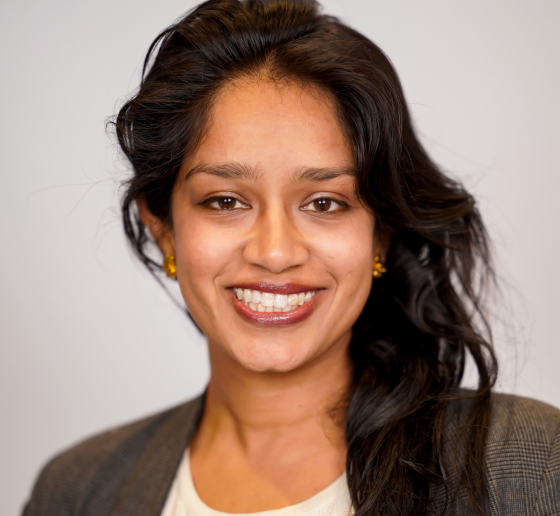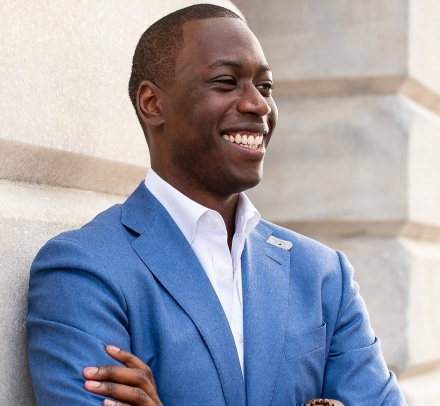How I Got Here: Suchita Mathur ’14
Suchita Mathur LAW ’14, SIPA ’14 is a senior litigation attorney with the American Immigration Council in Washington, D.C.

What exactly do you do?
I joined the American Immigration Council about a year ago. AIC is a nonprofit that advocates on behalf of immigrants and works toward a more fair and just immigration system. I focus generally on federal litigation on behalf of organizational plaintiffs or class actions. Because of my background doing removal defense and because I worked for a nonprofit in Mexico, some of the cases I am working on include litigation about access to asylum at the southern border and access to attorneys in immigration detention.
I also do a lot of advocate education: We put out practice advisories meant for the immigration bar. They’re hypertechnical, but we have the time to do the extensive research and put out resources that we hope will be helpful to the people who are actually working with clients and have less time to do the deep dives.
What do you like about your job?
Being in the impact litigation world is opening a new door for me, and I’m able to learn about how this new way of being a lawyer works. It’s like a return to law school 1L: civil procedure, federal court, all these things that as a removal defense attorney, [I thought], “I’m never going to revisit that.” But there have been times when I looked at my outline from one of my 1L courses—even though it’s now 10 years old!
Our litigation teams are often 20 lawyers from different organizations, so I’m getting the chance to meet people coming from different worlds and benefit from their diversity of experience. That opportunity to meet different folks and learn from them has been great.
Impact litigation is a term of art, but what does it mean in your view?
I have a background in direct services, so I see it in contrast to that. When you work with individuals, you have the ability to make a lot of important change—working alongside them—in their lives, in their cases. And if it gets to the appellate level, it can lead to systemic change. But impact litigation tries to get to that systemic change from Day 1, by trying to take on systemic problems and solve them through litigation, versus policy change or the political process. We’re looking at the problems that affect our client population—immigrants who are trying to come to the United States or who are already living here—and we think of ways that those problems can be solved through litigation.
The way I’m describing it makes it sound like a hammer in search of a nail. But my personal view is that it’s better for the solutions to come from people on the ground. For example, we’re working with two direct service organizations, Al Otro Lado and the Haitian Bridge Alliance, in our access to asylum cases. They’re the folks who are working with impacted people every day. We try to take our cues from them: What are the solutions you need, and how can litigation address them?
What prepared you for this job?
It’s really the willingness to sit down in your chair in front of your computer and spend hours on Westlaw—a classic thing you learned in law school. Taking a ton of material and trying to understand what’s relevant and what’s helpful to you, and why the cases that the government has cited are not helpful. That’s the academic side that I find really useful. On the practical side, I was able to do some really wonderful internships during the summer and externships during the school year at The Legal Aid Society, the Southern Poverty Law Center, the Center for Constitutional Rights. I took a great clinic with Professor Elora Mukherjee. That experience—the first time I really worked alone with a client, the interview skills—that’s all super important.
You earned an M.P.A. from Columbia’s School of International and Public Affairs (SIPA) at the same time as a J.D. from the Law School. How was your career path affected by participating in the dual degree program?
At SIPA, it was really helpful to meet people with a wide range of interests, experiences, and goals, and it made me feel, “I can do my own thing.” I had come to law school thinking I wanted to do international development work. My first summer, I interned at UNHCR, the U.N. refugee agency, in Geneva, which was a really cool experience of being in Europe, traveling, going to the U.N. and seeing very important-seeming things happening. But then, my second summer, I interned at The Legal Aid Society with an amazing attorney, Amy Meselson. She really opened my eyes to how you can be a lawyer and stand alongside people who are experiencing harm and work with them and get a concrete outcome for them. … And I was super drawn to that because it felt like a way to anchor oneself in the midst of all the problems that seem so intractable in society.
What is the hard part of your current job, and how do you cope with that?
The hard part of this job is trying to see the path to change and to feel that the work is relevant. I spend a lot of time reading about civil procedure and fighting about deadlines with the government and going deep into case law on really arcane subject matters. It’s sometimes hard to see the forest for the trees. You have to have faith that all this quibbling about seemingly unimportant things is going to hopefully make some impact on someone’s life one day.
Immigration reform is a politically divisive issue with little resolution in sight. How do you maintain your ability to fight another day?
The only real coping mechanism I have is looking to the resilience and perseverance and determination of people who are directly living with the impact of these systems and problems—the people who are just trying to get in through the border and people in detention who will stay there for a year or for two years for the chance to be with their families. I do volunteer work here in Washington, D.C., with migrants and assist people who have traveled in horrific conditions from South America just for a chance for their kids to have actual, real opportunities. It’s really easy to feel hopeless and to feel like everything one does is futile. But a lot of people who are living through these things in a direct way—they get up every day, and they do what they need to do. And that’s pretty inspiring.
This interview has been edited and condensed.
